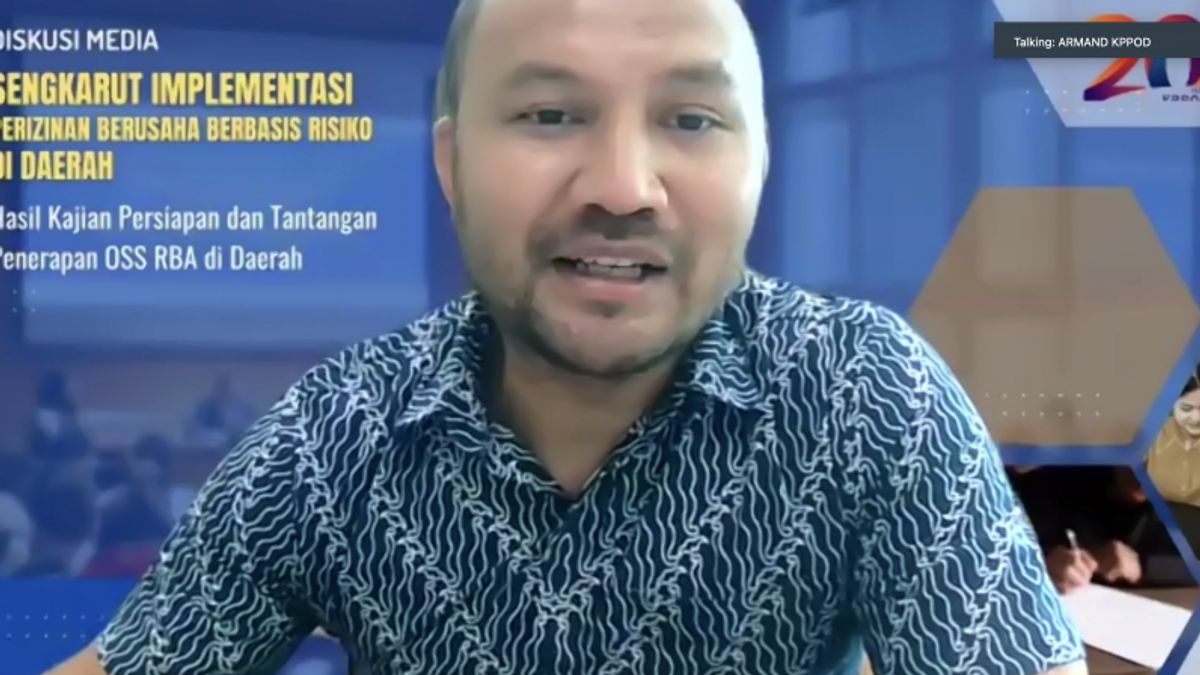JAKARTA - Executive Director of the Monitoring Committee for the Implementation of Regional Autonomy (KPPPD) Herman Nurcahyadi Suparman revealed that inflation control is not only the responsibility of the central government, but also the regions.
Therefore, local governments must also play an active role in controlling inflation in their respective regions.
Herman said the KPPPD supports the government's efforts to suppress inflation by issuing Minister of Finance Regulation (PMK) Number 134/PMK.07/2022 concerning Mandatory Expenditures in the Context of Handling the Impact of Inflation for Fiscal Year 2022 and Circular Letter of the Minister of Home Affairs Number 500/4825/SJ concerning the Use of Unexpected Expenditures in the Context of Regional Inflation Control.
"In this case, we KPPD agree with the government in an effort to control regional inflation," said Herman, Thursday, September 15.
Peneliti yang akrab disapa Armand ini menilai, skema pengendalian inflasi sebagaimana yang disebut dalam dua peraturan tersebut akan berdampak signifikan ketika memperhatikan beberapa faktor.
First, the provincial government must be active and be able to synergize inter-regional cooperation (KAD) in regencies/cities in its territory, especially for regions that are in surplus or deficit in maintaining the availability of commodity supplies.
"The allocation of funds will be successful if regional cooperation can be well established. The provincial government can synergize its regions. Because not all goods in the market come from the area itself," he said.
Armand also appreciated the government's efforts to encourage TPID performance by awarding the 2022 TPID Awards. However, he suggested that there are also sanctions given to regions that do not show good performance in reducing inflation in their respective regions.
"Incentives and sanctions are to encourage regions to be more enthusiastic about controlling inflation," he said.
In addition, Armand also reminded the importance of assistance from the central government through the Financial and Development Supervisory Agency (BPKP) in the implementation of various inflation control programs in the regions.
Meanwhile, the Director of Economic and Law Studies (Celios) Bhima Yudhistira appreciated this government step.
He assessed that providing incentives is a good thing, so regions have a sense of responsibility to participate in controlling inflation, even though so far there has been coordination under TPID.
"But with incentives, who knows, regions can also get Regional Incentive Funds (DID), so that it can be one of the most effective strategies to reduce inflation, especially food inflation," said Bhima.
But in addition to incentives, said Bhima, it also needs to be encouraged to strengthen cooperation between regions. Especially in overcoming logistics problems.
"But not enough with incentives, regions also need to increase coordination between regions that are in surplus and food deficits because areas that are deficit may be condition of regional contours, and challenges in terms of logistics need to be collaborated with other regions that are in surplus," explained Bhima.
According to Bhima, local governments also need to be more proactive to go down to the market, know their stock, and carry out accurate data collection.
"Lebih valid data collection, kepala daerah menurunkan tim langsung dan mengecek harga harian di pasar juga melakukan survei langsung kepada para petani untuk mengecek stok, misalnya beras," jelas Bhima.
Furthermore, Bhima said that the regional government should also be able to carry out the mandate. If there are obstacles, they can ask for assistance from the Ministry of Finance.
"Because the specific allocation for the program is usually the DAK fund is technically constrained, later to the absorption of the regional government budget. Here is the importance of consulting and technical assistance from the finance ministry and the Ministry of Home Affairs from the beginning of the budget manufacturing process," he said.
Sebelumnya, Menteri Koordinator Bidang Perekonomian Airlangga Hartarto mengungkapkan koordinasi antara pemerintah pusat dan daerah penting dijalankan guna menjaga tingkat inflasi di seluruh daerah di Indonesia.
Therefore, synergy is needed between the Central and Regional Inflation Control Team (TPIP) and (TPID) to formulate an inflation control policy program after the fuel price adjustment.
Airlangga also emphasized that local governments should not hesitate in using regional finance in an effort to control inflation in their respective regions.
"I again emphasize to all regions, there is no need to hesitate to use Unexpected Assistance (BTT) in controlling inflation, and optimizing Physical Special Allocation Funds (DAK) for thematic food security, as well as utilizing 2 percent of General Transfer Funds (DTU) to assist the transportation sector and additional social protection, because there is already a Regulation of the Minister of Finance and a Circular of the Minister of Home Affairs," said Airlangga.
The English, Chinese, Japanese, Arabic, and French versions are automatically generated by the AI. So there may still be inaccuracies in translating, please always see Indonesian as our main language. (system supported by DigitalSiber.id)










